
August 13, 2021
Happy National Acadian Day from the UNE Francophone Committee!

August 13, 2021
Happy National Acadian Day from the UNE Francophone Committee!
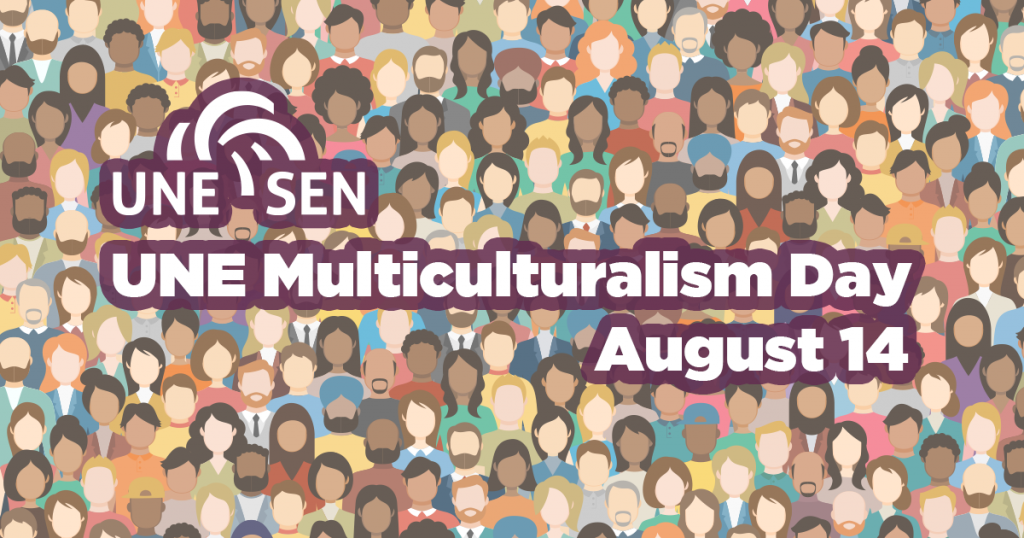
August 13, 2021
In 2011, at the Union of National Employees’ (UNE) Triennial a resolution was passed, with no challenges that allowed UNE members to observe August 14 as UNE’s Multiculturalism Day.
The intention behind this resolution was to foster a sense of pride, continued pride in UNE’s commitment to the rights of all of its members. More particularly, recognizing UNE’s contributions in the Human Rights arena, and more importantly acknowledging its very own Human Rights Committee and the work accomplished within that committee.
Canada as a country of diverse peoples and cultures celebrates Multiculturalism Day on June 27; however, UNE has gone a step further. As a union aware of its privilege, its place and its the role in the lives of its diverse membership, UNE has allocated another day whereby its membership, through its regional and Local representatives, is reminded to encourage the celebration of diversity throughout the rank and file of its Regions’ membership.
Let us as union comrades, UNE members, commemorate August 14 as a day to herald the diversity of our membership and celebrate our achievements, especially those won under the umbrella of Human Rights. A re-commitment to this day, August 14, as UNE’s Multiculturalism Day needs to be established and encouraged; always with focus, for with all that we have accomplished is as far as we still need to go.
Hayley Millington
UNE National Equity Representative for Racially Visible People
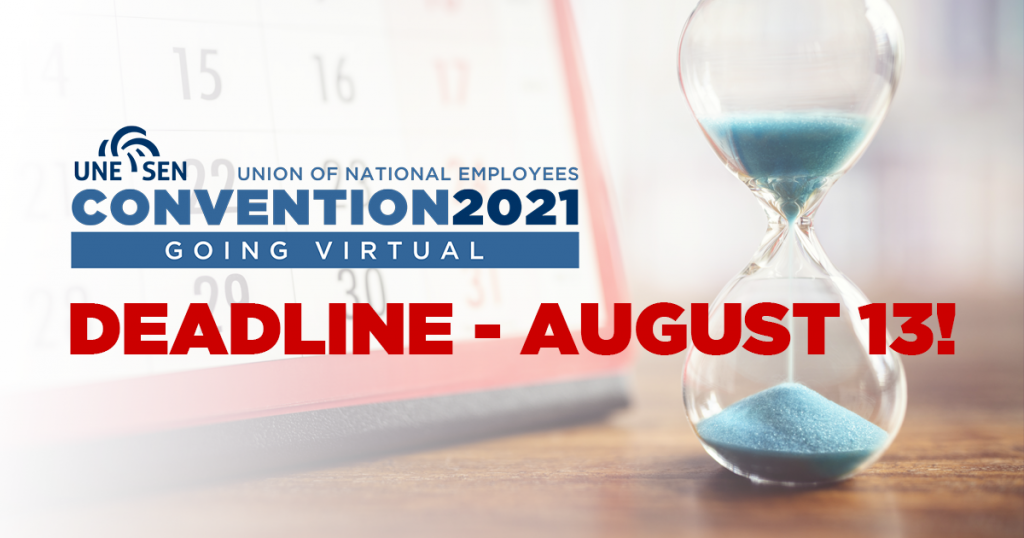
The 2021 UNE Triennial Convention has been rescheduled to September 13-17, 2021.
We are accepting late delegate registrations until August 13, 2021.
If you have already registered, you will be contacted with updated information as it becomes available. Please note the new deadlines below if your Local has not yet elected delegates, alternates or observers.
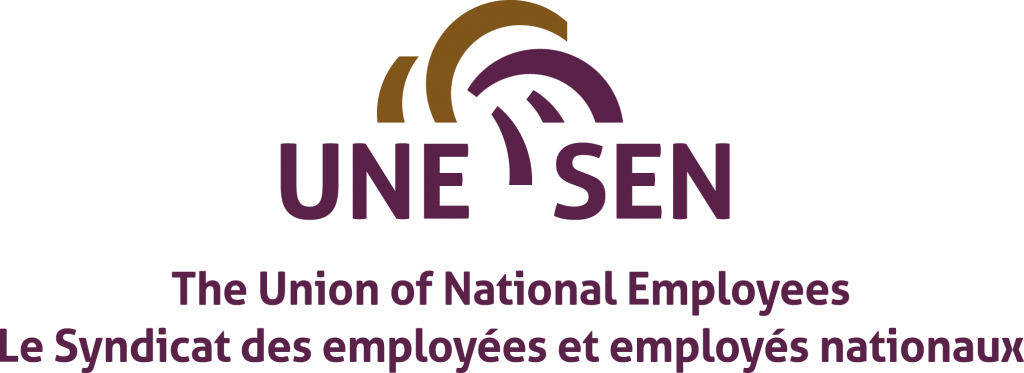
July 29, 2021
Slavery was abolished throughout the British Colonies via an act for the abolition of slavery that was given Royal Assent on August 28, 1833 and took effect on August 1, 1834. The act abolished enslavement in most British colonies, freeing over 800,000 enslaved Africans in the Caribbean, South Africa as well as Canada.
Many Commonwealth countries have acknowledged and designated this day as Emancipation Day. On August 1, 2021, for the very first time Canada will recognize this day. It comes on the heels of a unanimous vote in Parliament on March 24, 2021.
Emancipation Day is an opportunity for Canadians to learn about Canada’s role in the slave trade as well as providing the chance to acknowledge the systematic racism and discrimination that has led to multi-generational trauma affecting the lives of Black Canadians up to this present day.
Despite the fact that slavery has been abolished since 1833, it has left an endowment of systemic practices of racism and discrimination; barriers that Black Canadians encounter in their daily lives. The legacy of enslavement speaks to the fact that the work to eradicate anti-Black sentiments. It includes racist rhetoric and practices continuing almost 200 years after the end of slavery as an institution.
Oftentimes, Canadians are not always aware that the history of Black people in Canada is one that includes enslavement and that those who fought against the practice of slavery were pivotal in shaping Canada as a nation. Descendants of the African diaspora continue to add to the mosaic of Canada’s diversity through their cultures and traditions, their involvements and contributions, achievements and innovations, as well as through their leadership.
We all have a role to play in lending our voices and efforts to the dismantling of the systemic barriers faced by Black Canadians. It is important to educate and to include the history of Blacks in Canada, ensuring that this is captured in the history books, and that it is taught in schools as part of the curriculum. Change is tantamount to our minds and to our hearts as we navigate the process of healing, as communities, individuals and as a nation.
Jamaican musician Bob Nesta Marley, who was also an advocate for the rights of Black people, and spoke up against poverty and western oppression sang,
‘’Emancipate yourself from mental slavery
None but ourselves can free our minds”.
As activists and citizens of the world, we should all be prepared to align ourselves, in allyship or leadership, in the forefront of this fight for true equality and inclusion in all aspects of life. As such, I invite our Union members and leaders alike to reflect, educate and involve yourself in the ongoing fight against anti-Black racism and discrimination.
Hayley Millington
UNE National Equity Representative for Racially Visible People

July 14, 2021
Earlier this year, PSAC and the employer submitted a joint application to the Federal Public Sector Labour Relations and Employment Board (FPSLREB) to combine the two Statistical Survey Operations (SSO) bargaining units. The FPSLREB approved the application on June 10, 2021, and we are awaiting the official certificate.
The ruling combines the Regional Offices and Field teams into one bargaining unit. The consolidated unit will provide an opportunity to negotiate a better contract for 1,950 SSO members and give us greater strength in numbers.
PSAC met with the employer to continue negotiations for a consolidated collective agreement in May and July. Our next scheduled meeting is August 17-18 and then again in September, though the dates have not yet been confirmed.
Sign up to our mailing list, read our frequently asked questions section on SSO bargaining and the merger, or check our SSO page for the latest updates.

Current PSAC members working for the federal public service received general damages as part of their March 3 pay. However, several issues remain outstanding:
Despite requests to accelerate the delivery of general damages payments for former and retired members, the government has set out to make the process available by the fall of 2021. We are disappointed by this lengthy implementation period. However, following pressure by the union, the government has indicated that eligible former members will be provided a more precise timeline for when they will be able to apply for damages payments by the end of July. We will update you at that time.
The government has also updated its general damages webpage so that former members can access forms and resources specific to PSAC members. Previously, former members reported receiving incorrect information, intended for members of other unions, via the government’s website.
As part of the Phoenix damages settlement, the government must provide a new claims process for current and former members who experienced out-of-pocket expenses and severe personal and financial impacts due to Phoenix. The government has also targeted fall 2021 as the deadline to finalize the process and make it available to members. At PSAC’s urging for more clarity on timelines, the employer has agreed to provide a more detailed timeline by the end of July. We will update you at that time.
PSAC maintains that general damages paid to all employees for “stress, aggravation, and pain and suffering” and for the late implementation of collective agreements are non-taxable. We continue to explore all legal avenues to reverse CRA’s decision to tax general damages paid to members and will provide updates as they become available.
Please be sure to keep your contact information up to date via the member portal to receive all the latest updates on PSAC’s Phoenix settlement.
For more information about Phoenix damages, please check out our FAQ.
Source: http://psacunion.ca/update-phoenix-damages-implementation
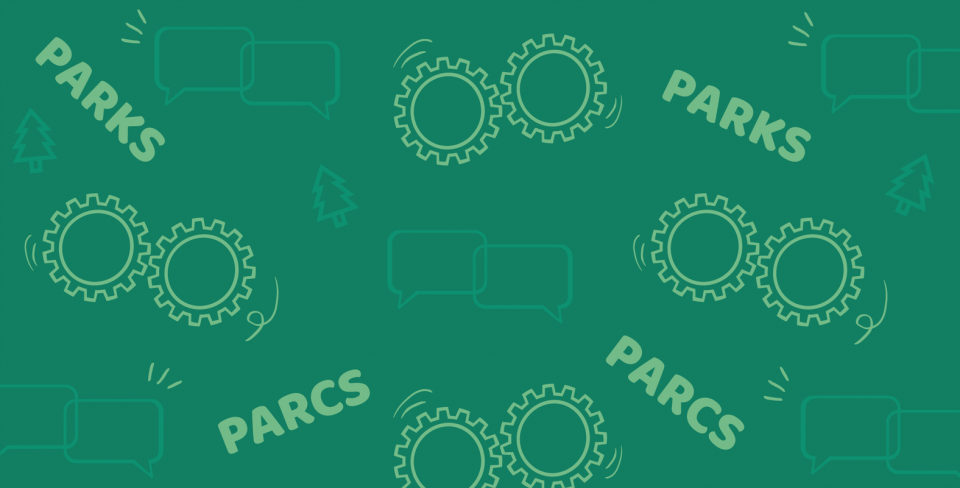
Passion and commitment were on the agenda at the Parks Canada Agency’s National Virtual Bargaining Conference, held from May 31 to June 2. Delegates from the Union of National Employees (UNE) and the Union of Canadian Transportation Employees (UCTE) came out of the conference more united than ever after electing their bargaining team and setting priorities for the new round of talks starting this summer.
Meet the Parks Canada Agency bargaining team:
Alternates
The bargaining team will be supported by the following PSAC staff:
Parks Canada Agency members proudly work to offer Canadians the best outdoor experience. The COVID-19 pandemic has greatly affected their work, but they stepped up to guarantee safe access to green spaces across the country. Their essential work in these uncertain times ensured that everyone could keep connecting with Canada’s rich natural and cultural heritage.
At the bargaining conference, members outlined the impact of the pandemic on their work and proposed solutions to improve their working conditions, all of which must be addressed with the agency.
Here is an overview of the key issues discussed at the conference:
Job security
In an agency where seasonal and student jobs are common, achieving job security is a top priority. Under the current system, precarious employment creates a lot of stress and is detrimental to mental health.
PSAC is committed to opposing all forms of precarious employment and ensure that all members have access to indeterminate employment.
Fair wages
We must secure wage increases that reflect the rising cost of living as well as our members’ skills, professionalism and dedication.
Many members have also experienced a widening wage gap compared to their private-sector counterparts. We need wage adjustments that keep up with the wages of those doing similar work both within and outside the federal public service.
Remote work
We believe that provisions governing remote work will be most effective if negotiated into collective agreements.
We must also ensure that remote work is free from remote surveillance and unreasonable performance expectations, that employers cover associated expenses and that concerns relating to accommodations, ergonomics and health and safety are addressed.
Contracting out and privatization
Contracting out and privatization of public services increase costs and risk to taxpayers, reduce the quality of services, erode the internal capacity of the public service, create precarious work, and undermine initiatives that address pay equity and systemic racism.
We must tackle the alarming increase in contracting out of government work, including through temporary staffing agencies.
Work-life balance
We must also expand leave provisions (e.g. 699 leave, family-responsibilities leave and sick leave) to improve work-life balance, which is especially critical for women, caregivers and those with disabilities.
We also need to negotiate flexible work options that allow members to shape their workday to match their personal and family responsibilities.
Violence and harassment
Workplace violence and harassment are a health and safety issue that can have severe physical and psychological consequences for members.
We need to build robust mechanisms to tackle these issues, such as mandatory training and support for members.
Languages rights
Our membership at Parks Canada includes many Indigenous members and several parks are located on traditional Indigenous territories.
In recognition of this, it’s necessary to decolonize our collective agreement. We want the agency to formally recognize Indigenous languages and provide an allowance to members who work in their Indigenous language.
Next steps
Over the next few months, the Parks Canada Agency bargaining team will meet to discuss the bargaining issues prioritized at the National Bargaining Conference and work on a final package of bargaining demands that will be exchanged with the employer.
Make sure to keep your contact information up to date via the member portal to receive all the latest updates as we prepare to negotiate your next contract.
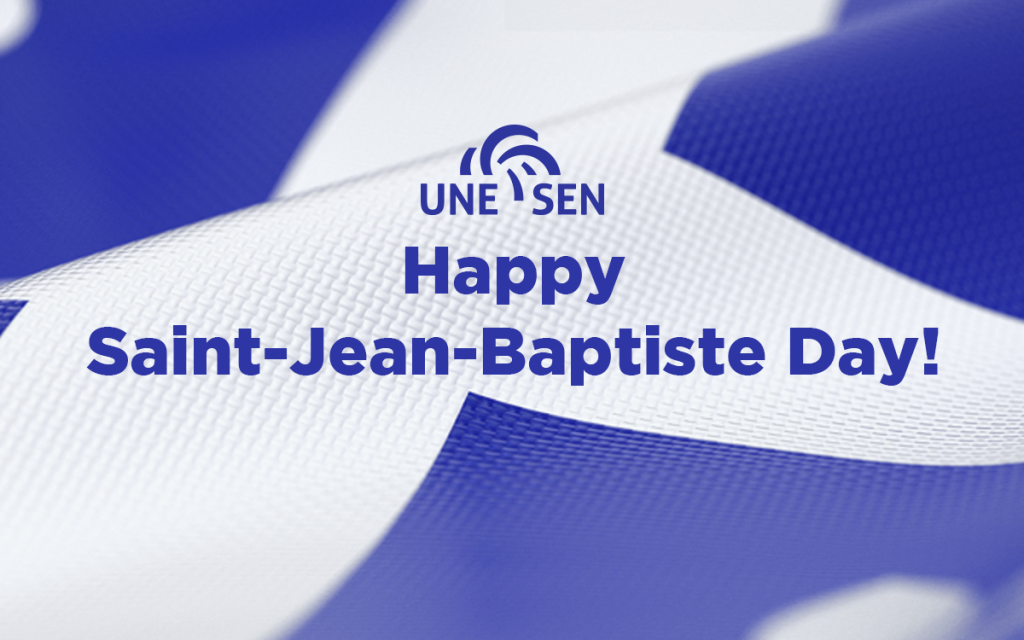
June 24, 2021
The members of the UNE Francophone Committee wish Happy Saint-Jean-Baptiste Day, Quebec’s national holiday, to all Quebec UNE members and those celebrating it across the country!
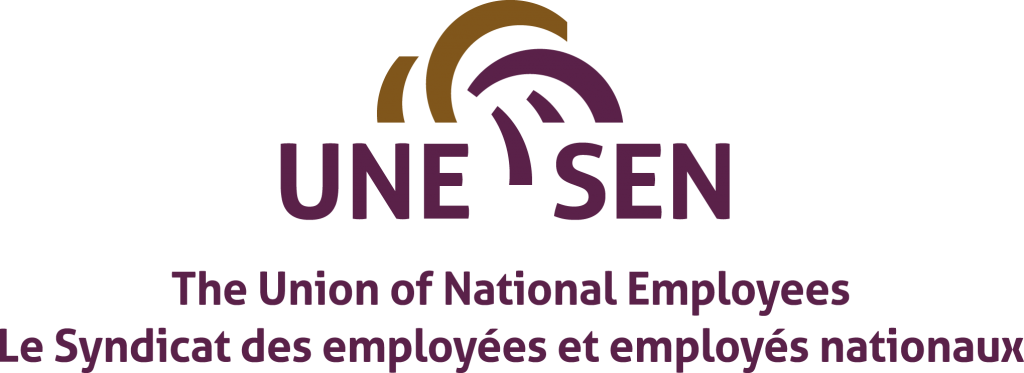
June 23, 2021
On June 21, National Indigenous Peoples Day, two important bills received Royal Assent. Bill C-15, titled United Nations Declaration on the Rights of Indigenous Peoples Act, and Bill C-8.
The first piece of legislation “provides that the Government of Canada must take all measures necessary to ensure that the laws of Canada are consistent with the United Nations Declaration on the Rights of Indigenous Peoples, and must prepare and implement an action plan to achieve the objectives of the Declaration.”
The second piece of legislation “amends the Citizenship Act to include, in the Oath or Affirmation of Citizenship, a solemn promise to respect the Aboriginal and treaty rights of First Nations, Inuit and Métis peoples, in order to respond to the Truth and Reconciliation Commission of Canada’s call to action number 94.”
We wish to acknowledge the passage of these bills as part of the 2015 Truth and Reconciliation Commission of Canada’s recommendations. We also acknowledge remembrance of centuries of hostilities, persecution, and attempted assimilation of Indigenous peoples in Canada through colonization.
We condemn unequivocally the resistance and angst portrayed by many Conservative federal politicians regarding the adoption of Bill C-15. These matters took too long to be addressed, but these are necessary steps toward reconciliation with Indigenous peoples and towards building a society that enhances Indigenous-government relations.
Respectfully and in Solidarity,
Kevin King
UNE National President

June 9, 2021
Members of the Union Family,
We have now entered Pride Month and you will be seeing many activities happening across the country. I wanted to take a moment to celebrate this great country. Pride in Canada starts around the end of May and happens across the country until September. Pride means something different to each person. For some it is a protest for change, a festival to celebrate what has been achieved, a time that we can explore and find out who we are, be our authentic selves, be with our chosen family and many more personal ways and reasons. Those journeys and thoughts on pride are personal and varied. I hope that in this difficult time that we all stay safe, know you are not alone and there is union family out there for you if you need us. We are all here in solidarity for a diverse and inclusive Canada.
Here are a few sites that you can use to explore and some comments from other members of our union family:
Canadian Virtual Hospice – Two-Spirit and LGBTQ+ Proud, Prepared, and Safe
I love that Pride just gets bigger and brighter each year and that it celebrates every part of our diverse community and gives us all a platform to be visible and open with each other and with our many incredible allies. That being said, there are still people who aren’t fully or fairly represented, and we need to keep pushing the envelope by ensuring we are being as inclusive as possible to enable historically marginalized queer voices to be heard, validated and celebrated too.
Andrew Shaver – UNE National Executive Vice-President (he/him)
Pride for me means members of the 2SLGBTQ+ community being healthy as their authentic selves. Locally, private online discussions are used to find doctors that are friendly to the gender diverse. This should not be necessary; we should have equal access to healthcare without fear! UNE can advocate for improved healthcare and Pharmacare for the 2SLGBTQ+ community within their workplaces and beyond. It should also include expanded mental healthcare. Current access to the healthcare needs of the 2SLGBTQ+ community is limited and includes long wait times. The Yukon recently developed a new gender-affirming healthcare policy. I would love to see this same comprehensive transgender and gender diverse health and wellness policy advocated for Canada-wide!
Danielle Palmer – UNE Regional Representative for Human Rights, Alberta & NWT & NU
Each year, in June, the LGBTQ2+ community celebrates Pride month. We march every year, to help create awareness and support from the community we live in. We continue our fight year after year because of oppression, and the fight for equality to live our lives as our true selves. It’s also an opportunity to acknowledge that the fight for equality is not over. As long as discrimination on sexual orientation, gender identity, gender expression, or any other forms of discrimination exist we will continue to use our voices loud and proud.
Keith Lemoine – UNE President and Human Rights Representative, Local 10512
Pride was originally a riot, a fight for equal rights, to love who you love, to be who you truly are. 52 years later we are still hearing stories of people attacked for being their authentic self, of people being murdered for living as the gender they are instead of the gender society has assigned them, and of youth being forced from their homes and their family for not conforming. Our fight for equality is not over. We, as Union members, need to educate ourselves and others, so that we may all truly be equal. We all deserve respect, access to medical care, mental health resources, housing, community, and family support. Real love is just love, regardless of gender, or sexual orientation.
Janet Eileen Connor – UNE Regional Representative for Human Rights, Ottawa-Treasury Board
Yours in Solidarity,
Chris Little-Gagné (he/him)
UNE National Equity Representative for Lesbian, Gay, Bisexual and Transgender People